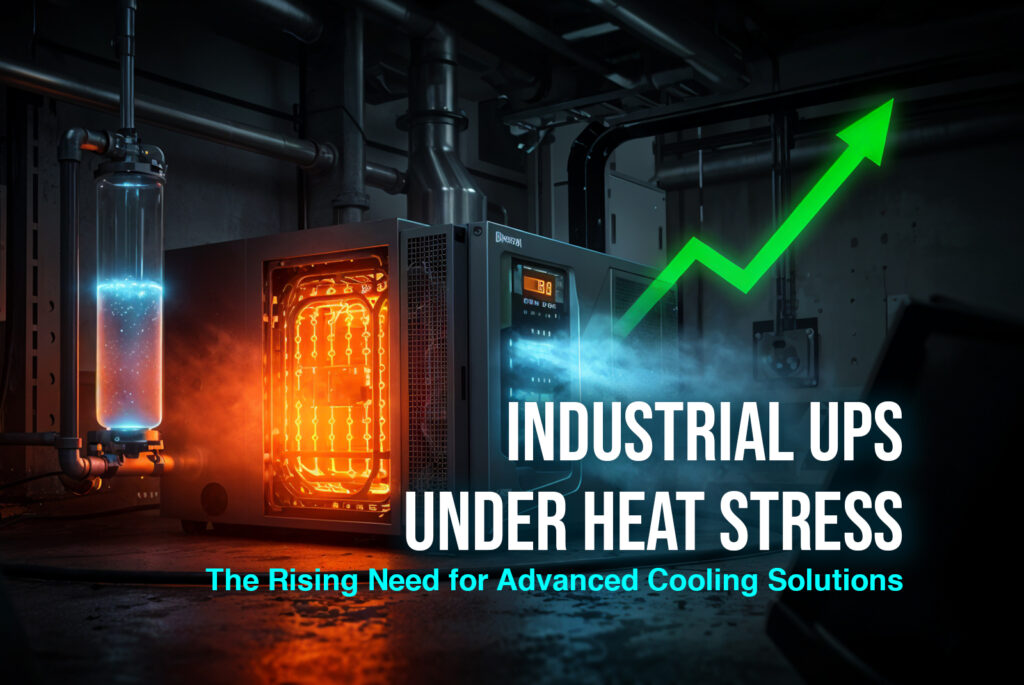Why Thermal Management in Industrial UPS Is More Critical Than Ever
Industrial Uninterruptible Power Supply (UPS) systems play a vital role in ensuring continuous power for mission-critical operations in industries such as oil & gas, data centers, pharmaceuticals, steel manufacturing, and IT infrastructure. However, as these systems handle increasing power loads, heat buildup has become a significant reliability risk.
Excessive heat can lead to:
- Reduced battery lifespan – High temperatures accelerate battery degradation, leading to frequent replacements.
- System failures – Overheated UPS units can experience malfunctions, shutdowns, or even fire hazards.
- Lower efficiency – High operating temperatures reduce power conversion efficiency, increasing energy consumption.
With rising industrial power demands, effective thermal management in UPS systems is no longer optional—it is a necessity.
Innovations in UPS Cooling: Tackling Heat Challenges
To combat heat-related failures, companies are integrating advanced cooling solutions into their UPS infrastructure. Some of the latest innovations include:
- Liquid-Cooled UPS Systems – Traditionally, UPS systems have relied on forced air cooling, but modern liquid-cooled UPS units offer superior heat dissipation. These systems remove heat at the source and improve energy efficiency.
- AI-Optimized Cooling – Similar to data centers, smart cooling systems powered by AI can analyze load conditions and temperature fluctuations to optimize fan speeds, airflow, and cooling intensity in real-time.
- Thermal Barrier Coatings – Industrial UPS units are now being designed with heat-resistant coatings to minimize thermal conductivity and improve heat dispersion.
- Phase-Change Materials (PCMs) – Some manufacturers are incorporating PCMs that absorb excess heat and release it gradually, preventing overheating during peak loads.
The Impact of Heat on UPS Battery Performance
A UPS system’s batteries are its most heat-sensitive components. Studies show that:
- For every 10°C increase in battery temperature, the lifespan decreases by 50%.
- At 25°C (77°F), a standard UPS battery lasts 4-5 years, but at 35°C (95°F), its lifespan drops to just 2 years.
- Lithium-ion batteries offer better heat tolerance, but still require effective cooling solutions to maintain peak performance.
As industries move towards higher-capacity UPS systems, addressing thermal challenges becomes crucial to ensure longevity, efficiency, and safety.
Future Trends in UPS Cooling & Thermal Management
The UPS industry is rapidly evolving, with new thermal management technologies set to redefine cooling strategies. Some key trends include:
- Hybrid Cooling Systems – Combining air and liquid cooling for maximum efficiency.
- Embedded AI Monitoring – UPS systems equipped with real-time thermal sensors and predictive analytics to preempt overheating risks.
- Green Cooling Solutions – Use of eco-friendly refrigerants and energy-efficient cooling mechanisms to reduce carbon footprints.
- Battery Energy Storage System (BESS) Integration – As industries transition towards renewable energy-based UPS systems, advanced cooling will be required to manage higher thermal loads.
With India’s industrial sector growing rapidly, ensuring reliable UPS thermal management is essential to prevent downtime, system failures, and financial losses. As new cooling technologies emerge, companies that adopt advanced thermal solutions will stay ahead in efficiency, cost savings, and sustainability.

